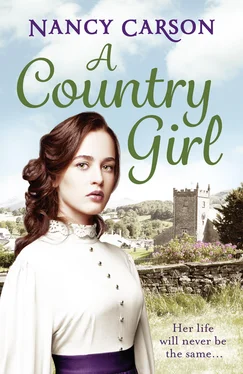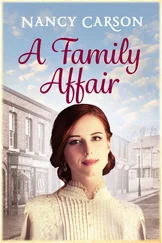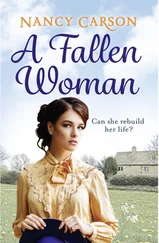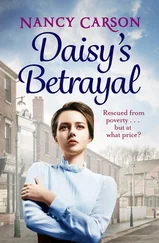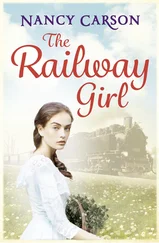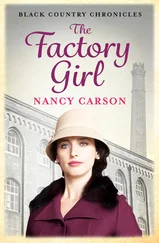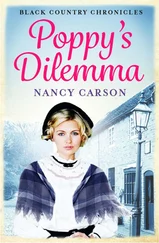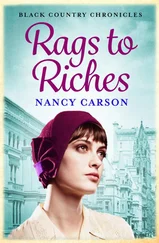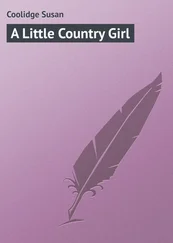‘I take it as you’ll see me girls and me wife home safe and sound, young Algie?’ Eli said patronisingly as he parted.
‘Course I will, Mr Meese.’
Actually, it had occurred to Algie to leave the company of Harriet and the rest of the Meeses as soon as the service was over, with the idea of seeking Marigold again; her father was likely to be in the Bottle and Glass for the evening getting pie-eyed, so why not take advantage? But to make an unusually early departure, on whatever flimsy excuse he could quickly invent, would only draw comment and speculation after he had gone, especially when he had given Eli his undertaking to see the family home safely. So, as they ambled down the path through the churchyard to the road, he decided to exercise discretion, to remain patient and wait till Marigold’s next passage through the lock at Buckpool.
While the others walked on ahead, Priss attached herself to Algie and Harriet.
‘I thought the sermon tonight was a bit of an unwarranted rebuke to us all,’ she commented airily. ‘The vicar’s wrong about God being just, you know. I hardly think He’s just at all, not all the time anyway. I’ve come to the conclusion that He is often unjust. Look how so many good and kind people suffer, while too many evil rogues prosper. What did you think of the sermon, Algie?’
‘Me? I didn’t listen to it.’
‘Algie was daydreaming as usual, Priss,’ Harriet said with measured scorn.
‘I was contemplating more earthly things,’ he replied.
‘Oh, but you shouldn’t of a Sunday,’ she reproached. ‘Anyway, what earthly things?’
Actually, he’d been contemplating Marigold Bingham; her smooth skin, her fine complexion, her beautiful face and her delicious figure. She’d been the cause of a troublesome disturbance in his trousers during the sermon as he’d allowed himself to imagine her lying warm and playful with him in some soft feather bed. He could hardly admit as much to Priss or Harriet, though.
‘I was thinking about the bike I’m going to buy,’ he fibbed judiciously.
‘Can you afford a bike?’ Priss queried, sincerely doubting it. ‘Surely they cost a fortune?’
‘I’ve been saving up for months. Now I’ve got enough money to buy one.’
‘But a bike ? Couldn’t your money be more wisely spent?’
‘On what?’
‘Well, you’re two-and-twenty now. The same as me. And our Harriet is only two years younger. Have you not considered the future?’
‘Priss!’ Harriet hissed indignantly, digging her sister in the ribs with her elbow as they walked.
‘Don’t prod me, Harriet … I only mean to say that if you are contemplating marriage, then it would be far more sensible to save your money, rather than buy a bike.’
‘Who says we’re contemplating marriage?’ Algie remarked clumsily. ‘We’ve never discussed marriage, have we Harriet?’
‘ You’ve never discussed it with me .’ There was a catch in her voice, which suggested antagonism at the lack of any such conversation.
‘I just assumed …’
‘Assume nothing, Priss,’ Harriet said with resignation. ‘Algie obviously has other priorities … and so have I, come to that.’
Eli Meese, Harriet’s father, having risen from humble beginnings as the son of a house servant, had embarked on his road to fortune buying bolts of cloth and selling them in lengths to whoever would buy. He viewed this as a means of escaping the pits and the ironworks. His first enterprise involved the purchase of two thousand yards of flannelettes at tuppence ha’penny a yard, which he sold at fourpence ha’penny a yard from market stalls in several of the local towns. Business prospered and he rented a shop in Brierley Hill as a permanent base. Soon afterwards, he met and married Mary, from whom his daughters inherited their uninspiring faces and would, in time, also manifest her stoutness. When their first child, Priscilla, was born he bought the building which was still home and workplace to him and his family. Eli was proud of being a self-made man. He had raised himself from obscurity to his present position, one of considerable standing in the community. He had made money a-plenty and, as money always commands influence, so Eli grew to be a man of some consequence in Brierley Hill, being not only churchwarden at St Michael’s but Guardian and Justice of the Peace as well. In his social elevation he sought to do his best for his daughters, and ensured that each received as decent an education as he could reasonably afford at the Dudley Proprietary School for Girls, to and from which they took the tramcar every day.
Eli was not entirely comfortable with the thought that his second daughter, easily the most appealing of those of marriageable age, could feasibly end up with the inconsequential son of a lock-keeper. He had hoped she would have set her sights higher, but was wily enough to realise that to forbid the liaison would only serve to launch it into more perilous waters, the consequences of which could be devastating and too painful to contemplate. In time, Harriet’s superior education would reveal itself to both of them, and Algernon Stokes would come to recognise his social and mental inferiority – and so would she. Meanwhile, he tolerated Algernon without actually encouraging him at all. Besides, Algernon’s father, Will, used to be Eli’s regular playmate in those far off days of mutual impoverishment. The lad’s mother, Clara, too … Indeed, when Clara was a young filly and Eli was a young buck with a weather eye for a potential mate, she had been a feast to the eye and a definite target. The trouble was, she was too preoccupied with his rivals and would have nothing to do with him. So he had to content himself eventually with Mary, who he’d put in the family way. Mary would never fetch any ducks off water. Her plainness, though, had proved an advantage in one respect, Eli pondered; she was never attractive enough to appeal to anybody else, which ensured her fidelity. On reflection, perhaps he had been too hasty in agreeing to marry her. The acquisition of wealth had made him much more appealing to other women – better-looking women – he’d noticed over the years.
Such were the ruminations, contemporary and nostalgic, of Eli Meese as he supped alone in the saloon of the Bell Hotel sucking at his clay pipe, his head enveloped in an aromatic cloud of blue smoke. Because he was an important citizen and a Justice of the Peace, few of the lesser locals these days considered themselves socially fit to sup in the same room with him. One man, however, walked into the hotel some little time after Eli, greeted him as an equal, and asked if he would allow him to buy him a drink.
Eli grinned in acknowledgement. ‘A pint of India pale, please, Murdoch.’
Murdoch Jeroboam Osborne paid for the drinks and took them over to the table where Eli was sitting. ‘You was deep in thought when I walked in, ha, Eli? Summat up?’
Eli swigged the last inch of beer that remained of his first helping, then sighed as if deeply troubled. ‘What d’yer mek o’ Will Stokes’s lad, Murdoch?’
Murdoch pulled a stick of tobacco from his pocket and began cutting it into workable pieces with his penknife as he pondered the question. ‘Can’t say as I know him that well, but he seems a likeable enough lad. Ain’t he a-courtin’ your Harriet? I’ve seen him a time or two come to meet her from the Drill Hall after our rehearsals, ha?’
‘Between me and thee, Murdoch, that’s what’s troubling me. I ain’t so sure he’s quite up to the mark, if you get me drift.’
Murdoch laughed. ‘I seem to recall as his mother was well up to the mark at one time, ha? Still is, if you want my opinion.’
Eli grinned conspiratorially. ‘Aye, you’m right there and no mistake. Proper little poppet, was Clara Bunn. Many’s the time I’ve wished …’
Читать дальше
